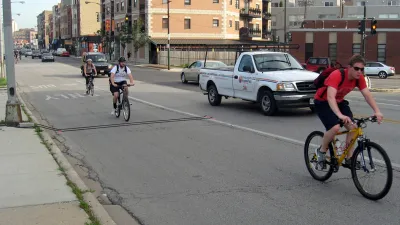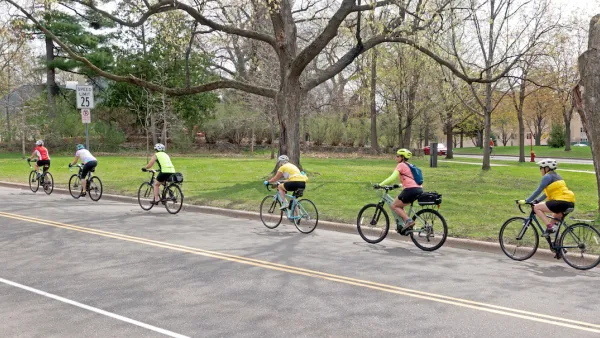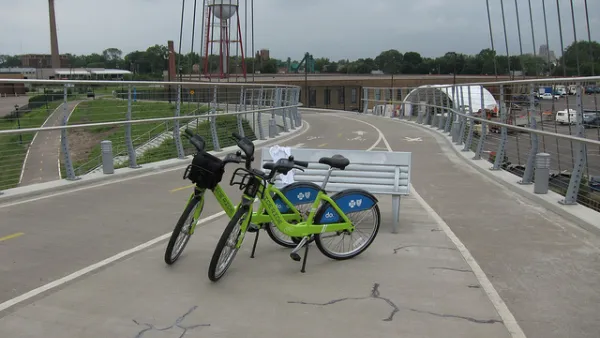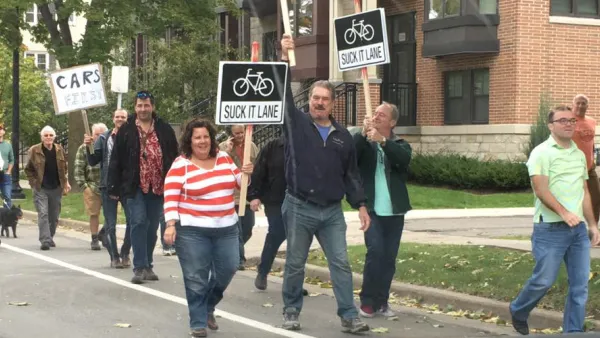Swatting down untruths and misinformation by bike lane opponents in St. Paul doesn't require a PhD, but it helps.

Writing in BeyondChron, Bill Lindeke sets the record straight on a few points used by bike lane opponents as St. Paul expands its bicycle path network through the city. Lindeke, a St. Paul Planning Commissioner who has a PhD in geography and bicycle planning, writes about his frustration at flyers given to neighbors along Cleveland Avenue, where opponents have stepped up efforts to block a bike lane on the street that would result in the loss of or shift of some street parking to side streets.
If you believe that your career depends on a parking space, there’s no amount of research, argument, or kindness that will convince you that a bike lane might benefit Cleveland Avenue.
And to make a long story short, this flier represents a dishonest argument about street design that appeals to those invested in the status quo. On the surface, these objections might seem reasonable. But they actually reflect how inflexibility about street design and urban transportation, in order to cling to slight comforts, keeps a dangerous precedent in place for another decade.
Opponents have cited the proposed reduction of driving lane widths on Cleveland from 12 feet to 11 feet as creating a dangerous situation, although as Lindeke points out, just the opposite is true. Statistics show that in the urban environment wider lanes are more dangerous than narrower lanes.
Opponents are also asking that the route be entirely "off-street" for safety reasons, or else the entire thing should be scrapped. Lindeke notes that "smart cities build infrastructure for the whole range of bicyclists and allow them to choose where and how quickly they want to ride… it turns into a spectrum of bicycle infrastructure." Asking for perfection or nothing is just another tool of opponents to block bicycle lane development, Lindeke argues.
FULL STORY: Two Anti-Bike Lane Narratives that Need to Stop

Analysis: Cybertruck Fatality Rate Far Exceeds That of Ford Pinto
The Tesla Cybertruck was recalled seven times last year.

National Parks Layoffs Will Cause Communities to Lose Billions
Thousands of essential park workers were laid off this week, just before the busy spring break season.

Retro-silient?: America’s First “Eco-burb,” The Woodlands Turns 50
A master-planned community north of Houston offers lessons on green infrastructure and resilient design, but falls short of its founder’s lofty affordability and walkability goals.

Test News Post 1
This is a summary

Analysis: Cybertruck Fatality Rate Far Exceeds That of Ford Pinto
The Tesla Cybertruck was recalled seven times last year.

Test News Headline 46
Test for the image on the front page.
Urban Design for Planners 1: Software Tools
This six-course series explores essential urban design concepts using open source software and equips planners with the tools they need to participate fully in the urban design process.
Planning for Universal Design
Learn the tools for implementing Universal Design in planning regulations.
EMC Planning Group, Inc.
Planetizen
Planetizen
Mpact (formerly Rail~Volution)
Great Falls Development Authority, Inc.
HUDs Office of Policy Development and Research
NYU Wagner Graduate School of Public Service




























